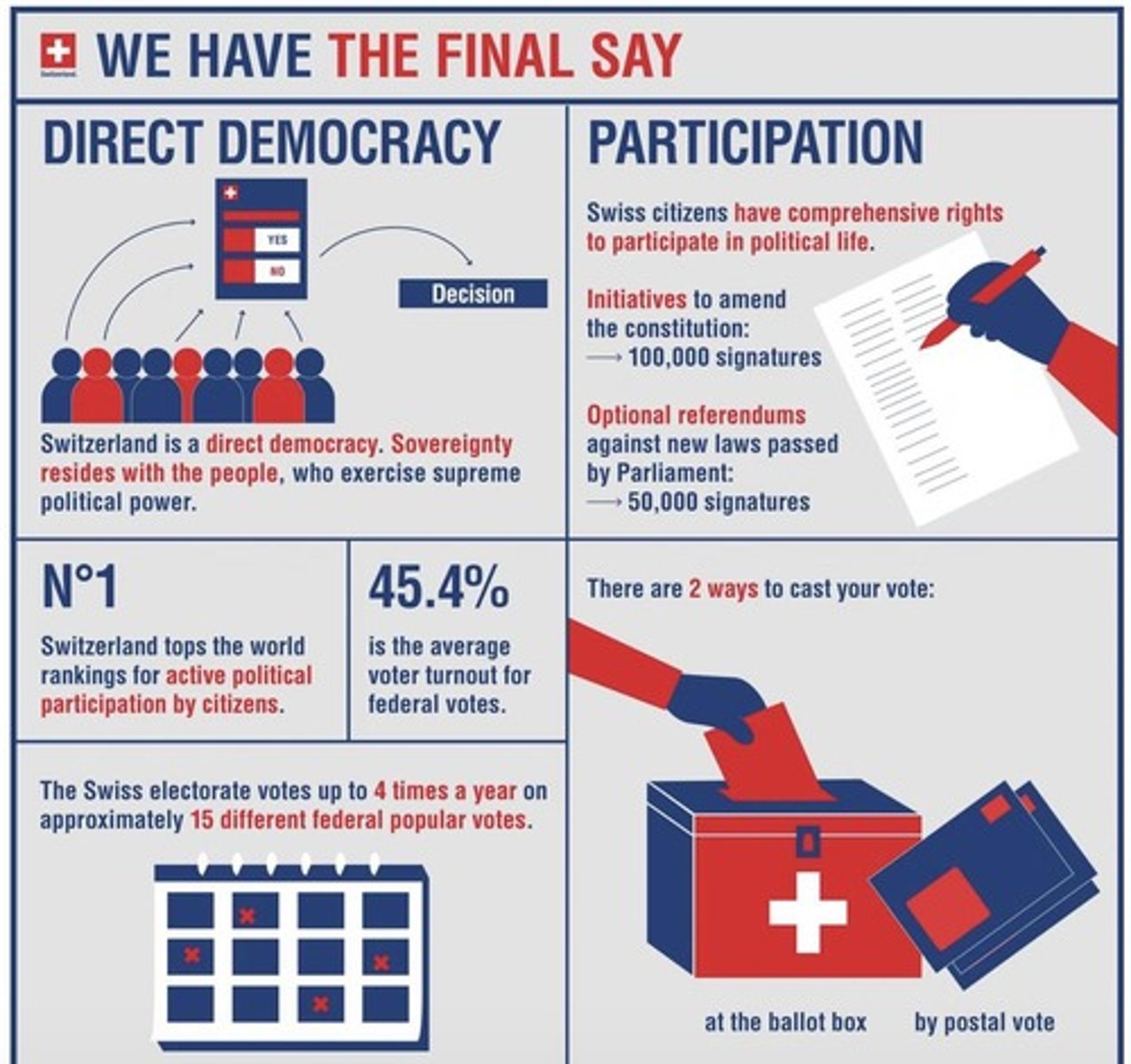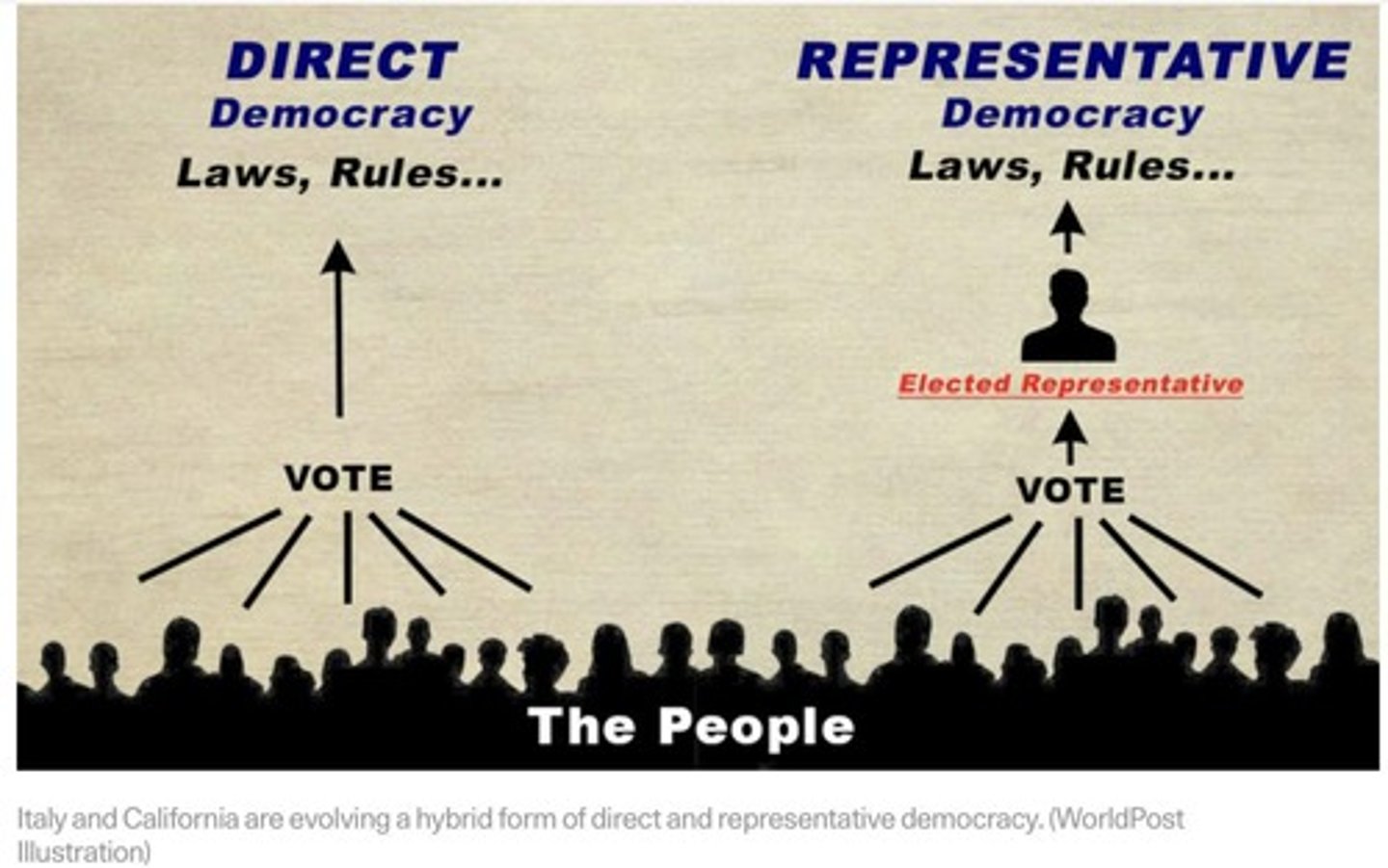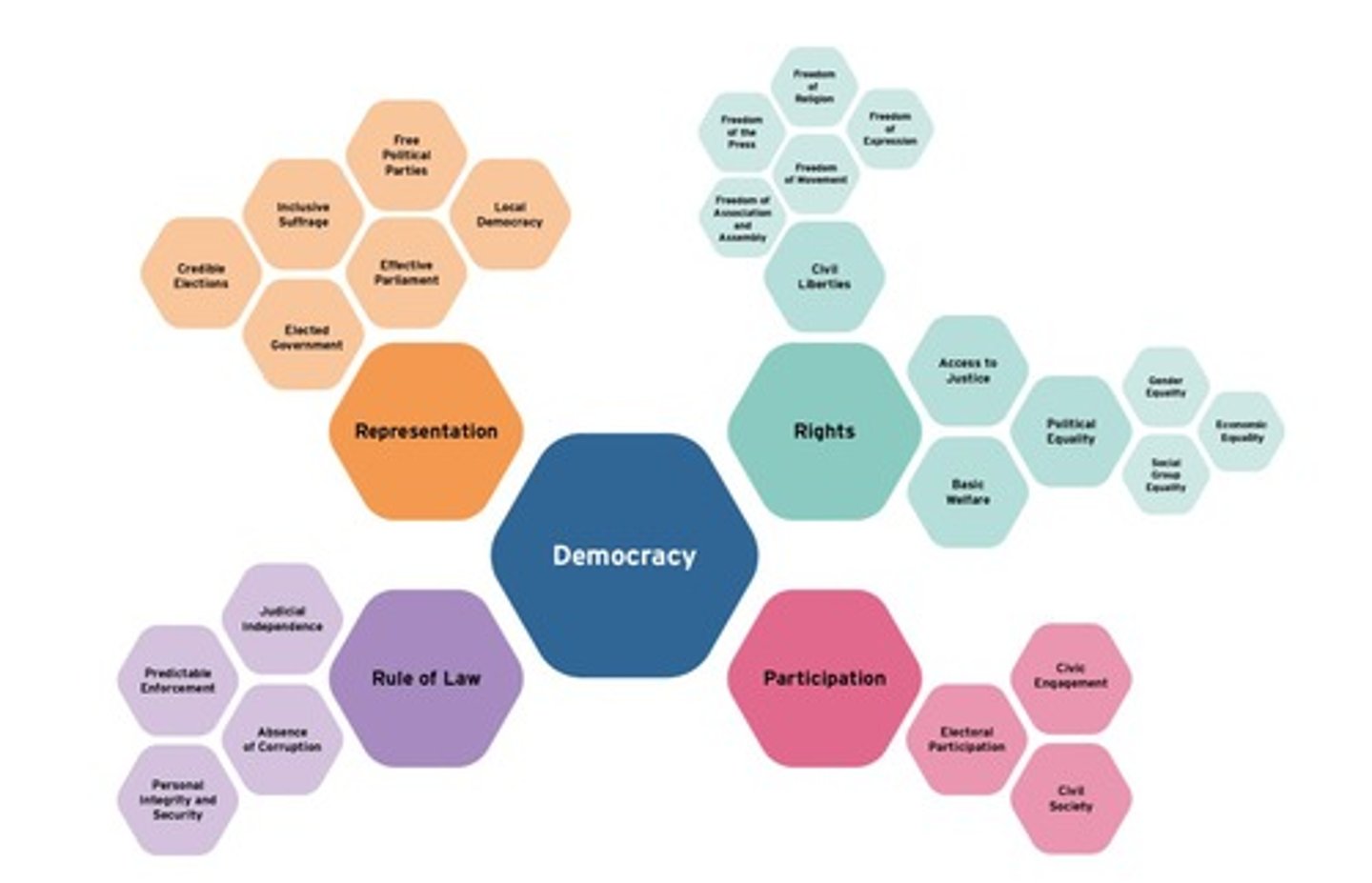Comprehensive Overview of Democratic Theory and Rousseau's Social Contract
1/264
There's no tags or description
Looks like no tags are added yet.
Name | Mastery | Learn | Test | Matching | Spaced |
|---|
No study sessions yet.
265 Terms
What is the common assumption about democracy?
Only a democracy is ever fully justifiable.
Define democracy.
Government of the people, by the people, and for the people.
What does 'government for the people' imply?
The government exists for the sake of its citizens, not for the benefit of the rulers.
What is direct democracy?
A system where citizens vote directly for or against laws and policies.

What is representative democracy?
A system where citizens vote to select representatives who will make decisions on their behalf.

What is the formula for democratic theory?
The balance between majority rule and individual rights, as well as representative versus direct democracy.
What did Voltaire argue regarding government?
He argued in favor of benevolent dictatorship.
What is the 'Sixth-Grade Model of Democracy'?
An empirical model that outlines principles of citizen awareness, learning, voting, and accountability.
What is democratic backsliding?
The phenomenon where democracy is in decline.
What is retrospective voting?
When citizens evaluate candidates' performance and vote them out if they did poorly.
How do some theorists view democracy?
As a term of praise rather than a coherent political system.
What is the definition of democracy according to Christiano?
A method of group decision-making characterized by equality among participants at essential stages.
What does Kavka define as government?
A subset of society that claims a monopoly on the legitimate use of coercion.
What is political democracy?
A form of government where almost all people have the right and opportunity to participate as equals.

What is a republic in the context of democracy?
Historically referred to a government with voting rights and constitutional constraints on the majority.
What is an essentially contested concept?
A term describing a concept like democracy, where its meaning is a political debate that can never be settled.
What criticism did John Stuart Mill have regarding democracy?
He suggested that ruling in one's own interests could lead to political oppression.
What is the view of democracy as instrumentally valuable?
It is valued for its usefulness in achieving goals like wise decisions or economic prosperity.
What is the symbolic value of democracy?
It represents the idea that all people matter equally.
What does it mean for democracy to be an end in itself?
It is considered valuable for its own sake, embodying fairness, equality, or freedom.
What is the historical view of democracy according to ancient thinkers?
Democracy was often seen as a pejorative term and a degenerate form of governance.
What is the modern perception of democracy?
It is often viewed as an unassailable ideal and the only legitimate form of government.
What is the concern about non-democratic countries and democracy?
They often ************* democratic through sham referendums or rigged elections.
What is the relationship between dissatisfaction with democracy and support for strongman leaders?
Dissatisfaction can lead to support for authoritarianism, which undermines better democracy.
What does the term 'democratic backsliding' refer to?
The decline in the quality and quantity of democratic governance.
What is an autocrat?
A ruler who has absolute power.
How do today's autocrats use public institutions?
They convert them into political weapons to punish opponents and intimidate media and civil society.
What is competitive authoritarianism?
A system where parties compete in elections, but the abuse of an incumbent's power skews the playing field against the opposition.
What is legitimate opposition in a democracy?
The right of all citizens to criticize, organize opposition, and seek to remove the government through elections.
What happens to opposition under authoritarian regimes?
Opposition comes with a price, including punitive measures against critics, such as investigations and harassment.
What chilling effect has the Trump administration had on political donations?
Fear of retribution has led to reduced donations to Democrats and progressive organizations.
What is the cumulative effect of media self-censorship?
It can significantly impact public opinion and the effectiveness of opposition.
What is the role of civil society in defending democracy?
Civil society must act collectively to preserve democratic principles and share the costs of defiance.
What are the two models of democracy discussed?
The Aggregative Model and the Deliberative Model.
What does the Aggregative Model of democracy emphasize?
It focuses on aggregating citizen preferences to select policies and leaders.
What critiques are made against the Aggregative Model?
It ignores how preferences are formed, promotes individualistic rationality, and offers weak legitimacy for minority opinions.
What does the Deliberative Model of democracy focus on?
It emphasizes practical reasoning where citizens persuade each other through dialogue.
What are the ideals of justice related to self-development?
Institutions should provide conditions for individuals to use their skills in satisfying and recognized settings.
How does the Deliberative Model protect against tyranny?
It promotes cooperation, problem-solving, and justice through interaction and dialogue.
What is a foundational principle of democracy?
Legitimate opposition, where citizens can freely criticize and organize against the government.
What actions did the Trump administration take against critics?
It deployed law enforcement against critics and threatened punitive actions against individuals and organizations.
What is the significance of fear in political opposition?
Fear of retribution can deter citizens from opposing the government, undermining democracy.
What does the term 'weaponization of government' refer to?
Using government agencies to punish political opponents and suppress dissent.
What is the impact of fear of violence on political behavior?
It can dissuade lawmakers from voting against powerful figures, like Trump, due to threats of violence.
What does Iris Young argue about the value of democracy?
Democracy is valued for both intrinsic rewards and instrumental reasons, such as restraining abuse of power.
What is the transformative aspect of the Deliberative Model?
It allows citizens to change their interests and beliefs through interaction with others.
What is the role of Congress in the context of Trump's actions?
Congress plays a critical role in creating laws and overseeing the federal government's actions.
What does the term 'judicial defiance' refer to?
Leaders claiming the power to disregard or override court orders, which is rare in democratic contexts.
What does self-determination enable individuals to do?
It allows individuals to participate in determining their actions and conditions.
What is the opposite condition of self-determination?
Domination, where others or groups control without reciprocity.
Who proposed the concept of 'freedom as non-domination'?
Philip Pettit.
What is Young's definition of social justice?
Institutional conditions promoting both self-development and self-determination of all members.
What are ideal deliberative conditions in democracy?
Inclusion, equality, reasonableness, and publicity.
What is the circularity problem in democratic theory?
It assumes justice because deliberation starts under just conditions, which no existing democracy meets.
What are the characteristics of real democracies?
Marked by inequality, exclusion, coercion, and distortion by unequal resources.
What is a proposed solution to political inequality?
Widening democratic inclusion to disrupt the cycle of inequality.
What is the 'privileging argument' in deliberative models?
An overemphasis on logical reasoning can exclude voices and needs outside accepted frameworks.
What does the norm of orderliness in deliberation imply?
It equates deliberation with civility, potentially excluding disruptive protests.
What is the common good assumption in some deliberative models?
It requires setting aside differences for a shared good, which Young argues against.
What flaws exist in Canada's electoral system according to critics?
Winner-take-all leads to unrepresentative results and manipulation of the process.
What is voter fatigue?
A decrease in trust and turnout due to constant elections and by-elections.
What is the conflict of interest in Canadian politics regarding electoral laws?
Politicians control election laws and resist changes that could weaken their power.
What did the Longest Ballot Committee aim to highlight?
The need for electoral reform by flooding the ballot with candidates.
What was Pierre Poilievre's response to the protest by the Longest Ballot Committee?
He called it a 'scam' and wanted stricter laws for candidate nominations.
What is the main criticism of the current electoral system in Canada?
Results do not match votes, deepening regional divides.
What electoral reform does Coyne advocate for?
Single Transferable Vote (STV) to better reflect actual voter preferences.
How has the power dynamic shifted within the Canadian Prime Minister's Office?
Power has increasingly centralized, with ministers acting more as spokespersons than decision-makers.
What is a significant issue regarding MPs in Canada?
They rarely propose laws and often vote with their party, limiting independent action.
What is the role of the Senate in Canadian politics according to Coyne?
It should only have a suspensive veto, delaying laws for 6 months, not blocking elected Commons.
What is a common issue with politicians in Canada regarding campaign promises?
They routinely break major campaign promises, eroding public trust.
What effect do politicians breaking campaign promises have on public perception?
It creates public cynicism, leading to the belief that 'all politicians lie.'
What is the proposed solution by Coyne for addressing false campaign promises?
A Truth in Politics Act where parties opt in and face consequences for false promises.
How has televised Parliament affected public perception of democracy?
It has turned into a performance for clips rather than genuine debate, distorting the view of the House of Commons.
What does Coyne warn about the future of democracy without reform?
He warns that regional divides and public distrust may worsen until a crisis forces change.
According to Elizabeth Anderson, what is the purpose of government?
To satisfy individual preferences.
What is the main way citizens participate in democracy?
Voting.
How does Anderson argue that democracy has both instrumental and non-instrumental value?
Voting is instrumentally valuable, but also valued as an activity itself, similar to shopping.
What is the common view of democracy that Anderson critiques?
Democracy is often seen as governing practices with only instrumental value.
What are the three levels at which democracy can be understood?
As a membership organization, a mode of government, and a culture.
What does democracy as a membership organization entail?
It involves universal and equal citizenship of all permanent members of a society.
What is the significance of deliberative democracy over majority rule?
Deliberative democracy emphasizes discussion among equals and reshapes preferences through dialogue.
What role does culture play in democracy according to Anderson?
Democracy as a culture involves cooperative interaction among citizens on equal terms.
What are the four plural goods realized by democracy?
1. Equality & mutual respect, 2. Protection against evils, 3. Shared goods of sympathy & autonomy, 4. Collective learning.
How does Mill view the impact of subordination in society?
He believes it harms both the oppressed and corrupts the privileged.
What is the critique of the instrumentalist model of democracy?
It justifies democracy only if it leads to valuable outcomes, neglecting the intrinsic value of people.
What does Anderson argue about the intrinsic value of people in politics?
Politics should serve people, not abstract outcomes like equality for its own sake.
What does the term 'experiments in living' refer to in Anderson's argument?
It refers to the idea that principles are tested empirically through practices like elections and free press.
What does Professor Danielle Allen argue about democracy and individual freedom?
She contends that democracy is the only system that protects individual freedom and prevents absolute power.
How does Allen define egalitarianism?
As an ancient idea reflecting the claim of ordinary people to freedom, encompassing various types of equality.
What reform does Allen suggest to improve democracy?
Party reform to eliminate party primaries.
What is Curtis Yarvin's view on current democratic systems?
He sees them as a 'guided democracy' controlled by prestige institutions rather than voters.
What does Yarvin argue about the case for monarchy?
He believes absolute monarchs historically delivered for their people and that democracy is incapable of doing so.
What does Yarvin suggest as a potential model for governance?
A CEO-style monarch, possibly figures like Donald Trump or Elon Musk.
What is Curtis Yarvin's core standard for government?
The results of governance, encapsulated in the phrase 'Whatever governs best is best'.
How does Yarvin view the concept of equality?
He rejects the idea that 'all human beings are created equal', comparing it to an unfalsifiable religious confession.
What does Yarvin compare the human desire for political power to?
A kind of lust and a sin.
What is Professor Danielle Allen's stance on democracy?
She acknowledges the need for institutional reform but believes renewal should come from within democracy.
What historical figures does Allen reference to warn against authoritarianism?
Hitler and Stalin.
What does Curtis Yarvin argue about American democracy?
He asserts that it has exhausted itself and needs to be replaced by one-man rule.
What is the first step in the general process of research according to the lecture?
Summarize: fully understand to avoid distorting evidence.